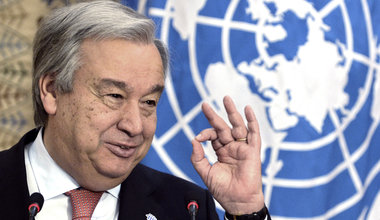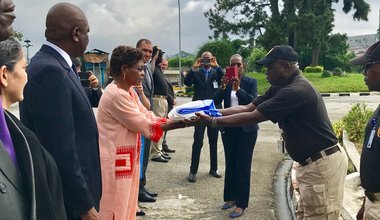Daily Brief on Côte d’Ivoire for Tuesday, 13 January 2009
Highlights
- DSRSG to attend
meeting on financing of electoral process
operation to restart in Bangolo after protest
in Moyen Cavally region
Electoral process
The Deputy Special
Representative of the UN Secretary-General for Côte d'Ivoire, Mr. Georg
Charpentier, was today due to attend a meeting on the electoral process between
the Prime Minister, donors and UN agencies in Abidjan.
Identification
The identification and voter
registration operation in the Bangolo area (west) is expected to restart this
week after it was suspended on 4 January 2009 following protests from the
population, which insisted that it should have been preceded by the
reconstitution of civil registers process. They claim that this would have given
people who lost their ID papers during the Ivorian crisis the opportunity to
take part in the operation. They insist that their area was disproportionately
affected by the crisis. However, the population agreed for the operation to
continue after several meetings with the sous-prefet of Bangolo. Meanwhile 17
identification centres in the Abengourou area (east) remain close due to a
strike by agents over the non payment of their salaries.
Security
Persistent insecurity continues unabated in the
Moyen Cavally region (west) notably in Guiglo and Saada, 57 km north of Duekoué,
where three separate armed attacks were carried out on 9 January 2009 by
unidentified individuals. The incidents resulted in one death and four injuries.
One of the attacks targeted the UNCHR Office in Guiglo where the assailants
physically assaulted three people before escaping with mobile phones, jewellery
and 35,000 FCFA ($70 approx).
Two people were injured yesterday during an attack by
armed bandits in Toa Zéo village, near Guiglo in western Côte d'Ivoire. A
MORBATT patrol was immediately dispatched to the area but the robbers had
already escaped. On the same day, individuals armed with AK47s held up a group
of traders along the Duekoué – Blody road, 7 km from Duekoué. They escaped with
mobile phones and an unspecified sum of cash.
UNOCI has received reports
that two employees of the Institut National de la Statistique (INS) were
attacked with truncheons by a man protesting against the rejection of a female
petitioner on 7 January 2009 in Zéaglo, 56 km west of Guiglo (west). The woman's
application was reportedly rejected after she failed to provide the original of
her birth certificate. The Zéaglo site has been temporarily closed pending the
outcome of consultations between administrative authorities and villagers. On 8
January 2009, UNOCI staff met with members of the Independent Electoral
Commission (CEI) and the sous-prefect of Bloléquin, 90 km west of Duekoué
(west) to discuss security conditions at identification sites.
Arms embargo
UNOCI military observers
yesterday successfully carried out an arms embargo inspection at the gendarmerie
brigade in Gohitafla (centre west).
Human Rights
Officials from the Benin Embassy in Côte d'Ivoire
conducted a field mission to Vavoua (centre west) on 7 January 2009, at the
request of the Human Rights Division to facilitate the repatriation of five
Beninois children, who were alleged victims of trafficking. The children, aged
between 10 and 15, arrived in Côte d'Ivoire in October 2008 were reportedly
forced by a 44-year-old Beninois to work 22-hour days in plantations,
restaurants and other services in the Vrouo 2 area in Vavoua. The accused was
arrested on 20 October 2008 by Forces Nouvelles (FN) authorities and detained in
the Seguéla prison. The case was settled by the FN authorities after the accused
paid 800,000 FCFA ($1,600) representing the cost of accommodation and
repatriation fees for the children.
The Regional Human Rights
Office in Odienné (north) conducted a fact finding mission to Tiefinzo, situated
north of Odienné on 11 January 2009. The Office met with civilian and FN
authorities at Tiefinzo and Samatiguila, sensitized them on human rights and
elections and urged them to pay particular attention to human rights violations
during identification and elections. At Kimbrila Nord, the Office held a working
session with members of the Human Rights Promotion and Protection Cell presided
over by the village chief. Members of the Cell expressed the need for continuous
sensitization on human rights, adding that since the creation of the Cell, cases
of human rights violations, especially those relating to violence against women
and children, had decreased and practically all the children in the village were
going to school.
 ONU
ONU Nations Unies Maintien de la paix
Nations Unies Maintien de la paix



